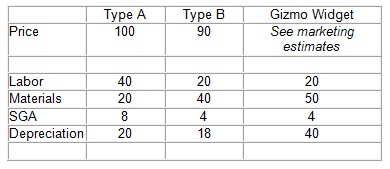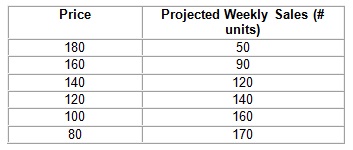Weston Industrial Manufacturing Products ("WIMP") has the capability to produce a variety of industrial products, including a number of types of widgets. In the past, WIMP has manufactured 2 different types of widget (Type A and Type B). Each of these is sold in a market that approximates a perfectly competitive market. Production is limited to standard shifts operating Monday through Friday due to a contract with the relevant labor union.
The average labor rate is $10 per hour and the company currently employs 10 laborers who work a single 8-hour shift each day. The company employs several salaried marketing and administrative employees. The following table provides price and cost data collected from the accounting department:
WIMP: Per-Unit Price and Cost Data by Widget Type

WIMP has recently developed a new widget, the "Gizmo Widget." The Gizmo Widget is designed to serve a niche demand segment in the manufacturing industry. Labor costs are relatively low but this is partially offset by higher materials costs.
The company recently upgraded machinery to enable the Gizmo Widget to be produced and this is reflected in higher depreciation charges. WIMP's marketing staff produced the following sales projections regarding the Gizmo Widget:

In the short run, WIMP cannot add to its labor force of ten employees and consequently there are only 80 labor hours available per day to allocate toward widgets.
Question 1: Which costs in the table of accounting information are relevant for making short-run economic decisions regarding the production mix of widgets? Explain and show.
Question 2: Ignore the Gizmo Widget for the moment. How should WIMP be allocating production between the Type A and Type B widgets?
Be sure to briefly explain your approach/reasoning.
Question 3: What is the profit maximizing number of Gizmo Widgets that should be introduced? Be sure to account for the fact that Gizmo Widgets displace other types of widgets. Again, be sure you provide a brief explanation of your approach/reasoning.